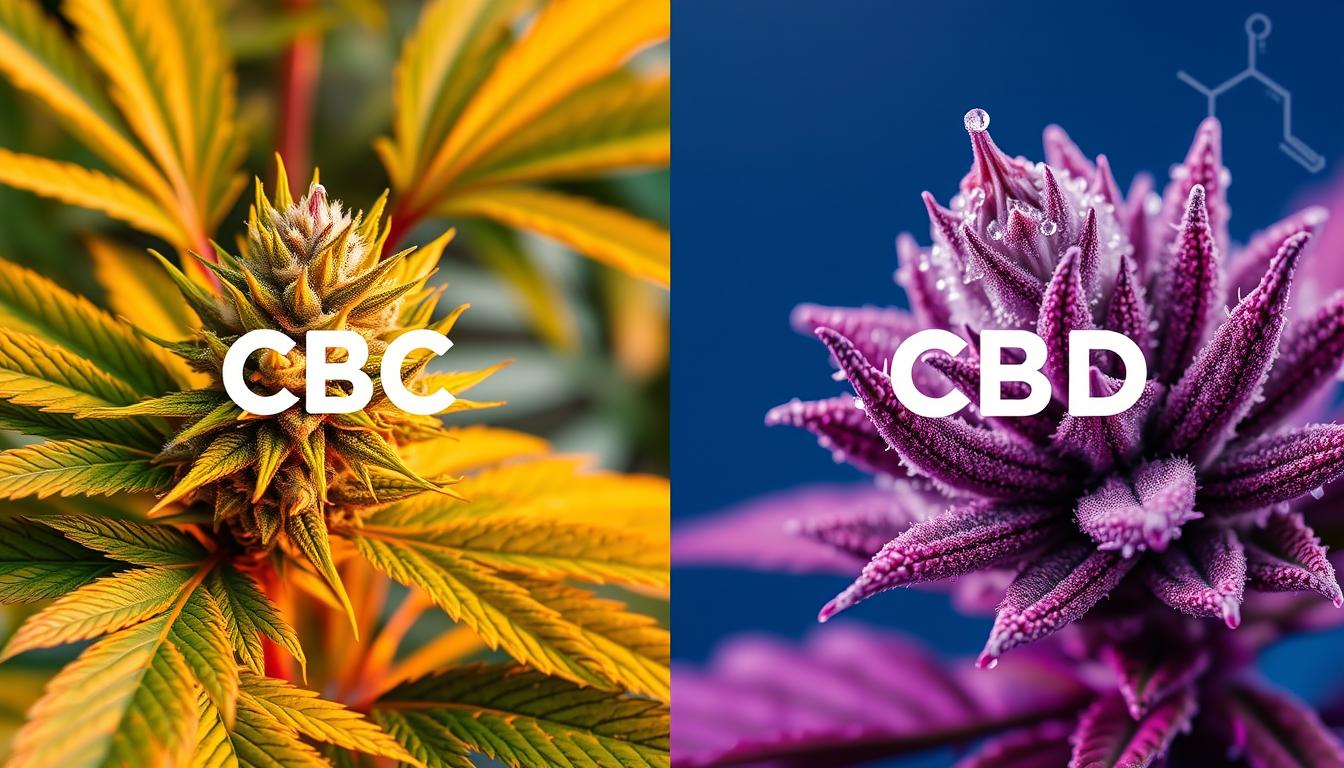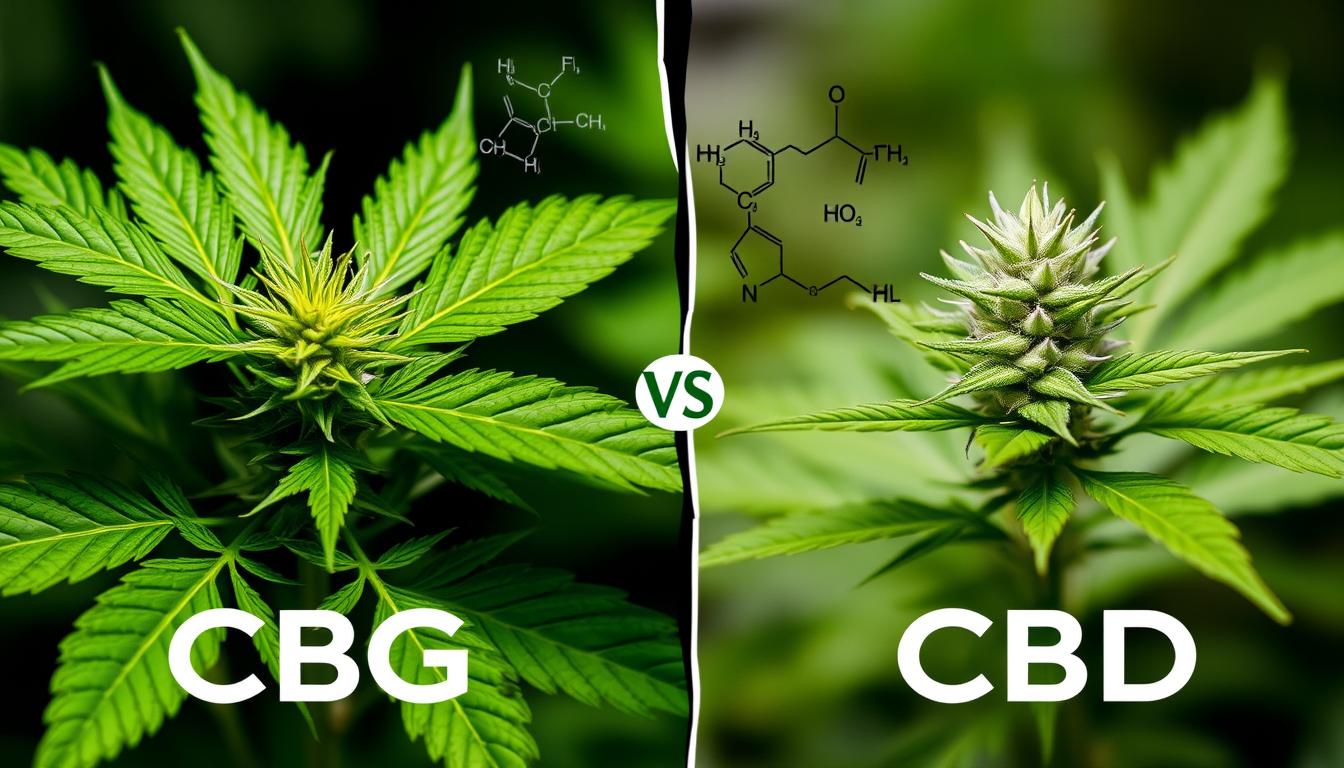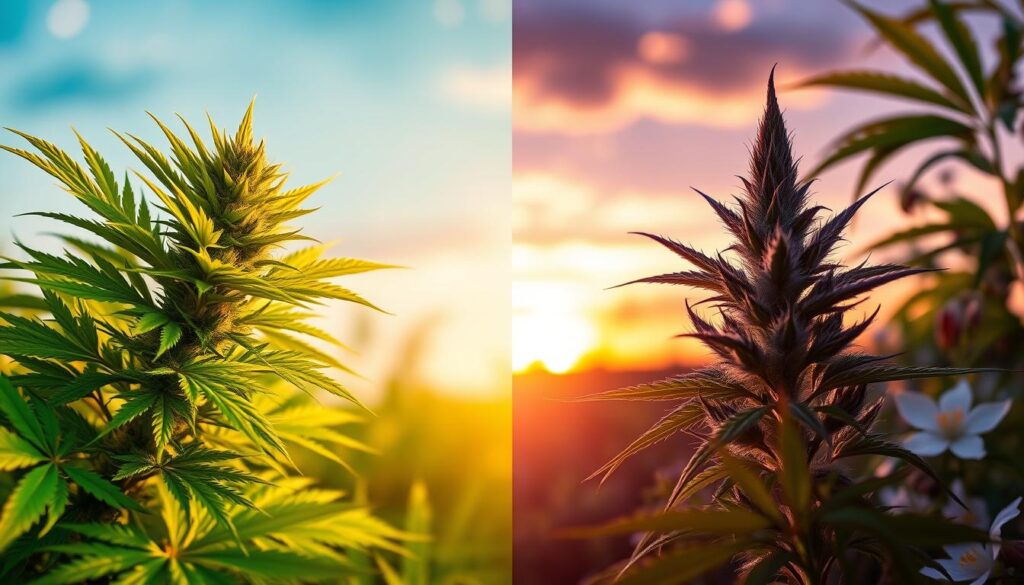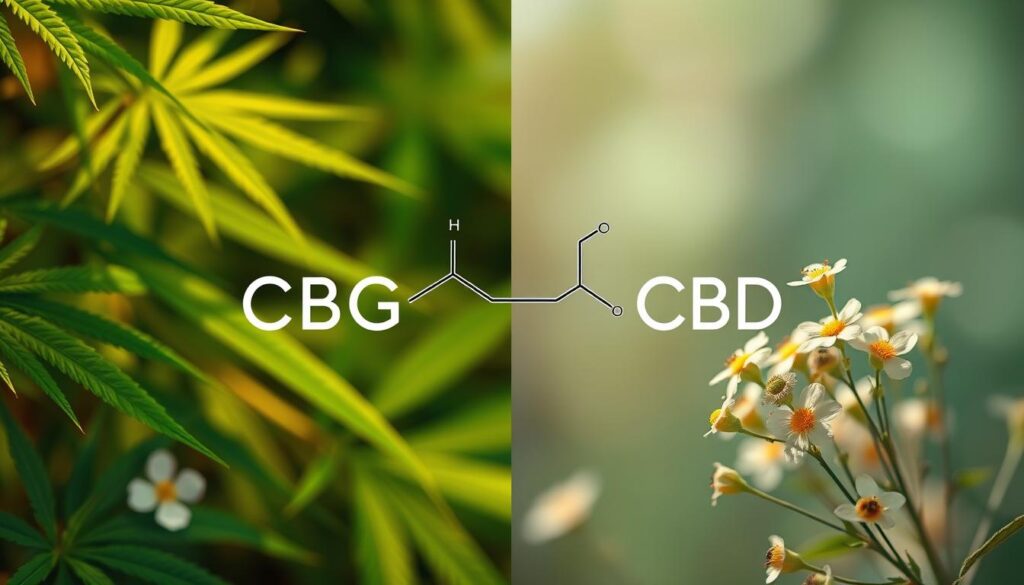Exploring the world of cannabinoids, we find CBC and CBD. CBD is well-known, but CBC is less known. Yet, CBC shows great promise for health. The differences between CBC and CBD are not just names. They affect how our bodies react and the benefits we get.
This cbc vs cbd comparison aims to help you choose the right one for your health. Knowing the cbc versus cbd differences is key. It shows why CBC is important, even with CBD being more popular.
Research points to CBC’s benefits in fighting inflammation and improving brain health. Let’s dive into these complex cannabinoids and their special qualities.
Key Takeaways
- CBC was discovered in 1966, while CBD gained attention in the early 2000s.
- CBC’s availability in the market is limited compared to the widespread presence of CBD.
- Research suggests CBC may be more effective for inflammatory pain.
- CBC and CBD interact differently with the endocannabinoid system, influencing mood and anxiety.
- Understanding these cannabinoids aids in making informed wellness choices.
Understanding CBC: What is It?
CBC, short for cannabichromene, was found about 50 years ago. It’s a non-intoxicating cannabinoid from the cannabis sativa plant. People are interested in CBC for its medical potential. Unlike CBD, CBC doesn’t make you high, making it a good choice for natural remedies.
Research shows CBC works with the body’s endocannabinoid system. It connects to TRPV1 receptors in the nervous system. This helps explain how CBC can help with inflammatory diseases. Studies suggest CBC can reduce inflammation and pain, helping with arthritis.
Over the years, CBC’s therapeutic value has grown, especially with CBD’s popularity. But, finding CBC is hard because it’s rare in cannabis. Still, studies show CBC might help with neurological health, like Alzheimer’s disease.
More research is needed on CBC’s benefits. It might help in cancer treatments and pain management. I’m excited to see how CBC can work with CBD, possibly leading to more benefits.
Understanding CBD: What is It?
Cannabidiol, or CBD, is a key compound in cannabis known for its health benefits. It became popular after the 2018 Farm Bill made hemp products legal. Unlike THC, CBD doesn’t make you high, making it a favorite for those looking for wellness without psychoactive effects.
Research on CBD has grown, with over 1,500 studies in 2021. These studies show CBD helps with anxiety and improves overall health. About 65% of people using CBD for sleep saw big improvements, and over 50% felt less stressed.
CBD is available in oils, topicals, and edibles, appealing to many. The global CBD market hit $4.6 billion in 2023, growing 17% yearly. Full-spectrum CBD combines many cannabinoids, offering a stronger effect. Broad-spectrum CBD, with cannabinoids like CBC but no THC, meets about 30% of consumers’ needs.
In short, CBD is known for its lack of psychoactive effects and its many health benefits. It’s a popular choice for those looking for natural health solutions.
| Characteristic | CBD | CBC |
|---|---|---|
| Concentration in Hemp | High | Low |
| Psychoactive Effects | No | No |
| Market Popularity | High | Emerging |
| Research Availability | Extensive | Limited |
| Product Forms | Oils, Topicals, Edibles | Less common |
CBC vs CBD: Key Differences Explained
Understanding CBC and CBD helps us see their roles in health and wellness. They work differently with our body’s receptors, affecting their uses. Let’s look at how these differences show up, especially in pain and inflammation.
Interaction with Receptors
CBC and CBD interact with our body’s receptors in different ways. CBC connects directly to TRPV1 receptors, which help with inflammatory diseases. This direct connection might help with arthritis and other inflammatory issues.
CBD, however, works mainly with 5-HT1A receptors. These receptors are key for pain and stress relief. This difference makes the cbc and cbd comparison important, showing how each works in its own way.
Pain Management and Inflammation
CBC and CBD have different effects on pain. Studies suggest CBC might be better for inflammatory pain because of its strong TRPV1 receptor interaction. This makes CBC a strong choice for those with inflammation-related pain.
While CBD is known for its pain relief, especially neuropathic pain, CBC offers a direct way to fight inflammatory pain. When choosing between CBC and CBD, consider these differences for effective pain management.
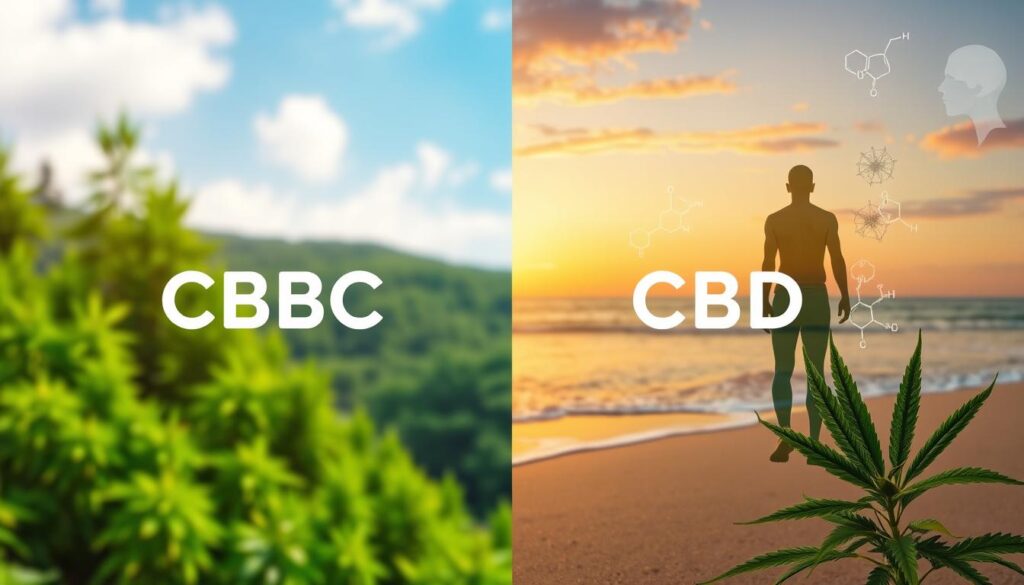
Potential Benefits of CBC
Cannabichromene (CBC) is getting more attention for its possible health benefits. Unlike THC, CBC doesn’t make you feel high. This makes it a good choice for many people. CBC might help with brain health and reducing inflammation.
Neurological Health
Research shows CBC could help with brain health. It might help grow cells in the brain that are important for treating diseases. This could lead to new ways to treat Alzheimer’s and other brain conditions.
Anti-Inflammatory Properties
CBC also has strong anti-inflammatory effects. It works with receptors in the body that help with pain and inflammation. This could help with conditions like arthritis and anxiety. Early studies even suggest CBC might help fight cancer.
| Benefit | Description |
|---|---|
| Neurological Health | Supports the development of neural stem progenitor cells. |
| Anti-Inflammatory Properties | Interacts with TRPV1 receptors to reduce inflammation and pain. |
| Cancer Research | May be linked to reduced tumor sizes and efficacy against breast cancer. |
| Potential Anti-Microbial Effects | Exhibits antimicrobial features, though details are still emerging. |
| Skin Health | Could be more effective than CBD for inflammatory skin conditions. |
Potential Benefits of CBD
CBD is getting more attention for its health benefits. It’s known for helping with anxiety and improving overall well-being.
Anxiety and Stress Relief
People use CBD to handle stress and anxiety. It works with 5-HT1A receptors, which help control emotions. Many say they feel calmer after using CBD.
As more people use CBD for mental health, its popularity grows. This shows its value in helping with anxiety.
General Health and Well-being
CBD’s benefits go beyond just easing anxiety. Studies show it can also improve sleep and overall health. Many have seen better sleep and feel more well after using CBD.
Like CBC, CBD is non-psychoactive. This means users can enjoy its benefits without getting high.
How CBC and CBD May Make You Feel
The world of cannabinoids offers a range of experiences, especially when considering cbc vs cbd. Both CBC and CBD are non-intoxicating, meaning they won’t cause a high. Yet, my experiences with these compounds reveal subtle differences.
Users of CBC often mention a sense of mild relaxation and slight relief from inflammation. This cannabinoid interacts directly with TRPV1 receptors, which may be beneficial for managing inflammatory conditions. A notable aspect of CBC is its potential impact on neurological health, particularly its influence on neural stem progenitor cells.
In contrast, CBD is well-known for its ability to ease anxiety and stress. Many users appreciate the calming effects without feeling sedated. CBD primarily binds with 5-HT1A receptors, contributing to my sense of relief from anxiety and promoting better sleep patterns. This versatility has made CBD products widely available, leading to enhanced accessibility compared to CBC.
As I explore my options, it’s clear that both CBC and CBD can influence my well-being in unique ways. I find that starting with lower doses is advisable, allowing me to adjust based on my individual response. Although some users have reported derived benefits from using both cannabinoids together, research in this area remains limited, highlighting the need for further study.

Considering CBC vs CBD Oil: Which Should You Use?
Choosing between CBC and CBD oil depends on your health goals and current conditions. CBC is great for fighting inflammation because it works with TRPV1 receptors. This makes it a good choice for pain relief.
For anxiety or wellness, CBD oil is often the better pick. It’s known for its calming effects and wide range of health benefits.
Availability is also key. CBC is less common than CBD, making it harder to find. CBD, however, is legal in many places, making it easier to get.
Think about how the oil is made and what’s in it. Talking to a healthcare provider can help you choose the right one for you. Paying attention to how your body reacts can also guide your decision.
| Criteria | CBC Oil | CBD Oil |
|---|---|---|
| Discovery | Approximately 50 years ago | Recognized in the early 2000s |
| Therapeutic Benefits | Focused on inflammation and pain relief | Alleviates anxiety, pain, and promotes wellness |
| Legal Status | Limited availability in regions | Widely legal in many areas |
| Extraction Source | Derived from stem cells | Derived from cannabis flowers |
Can You Combine CBC and CBD for Enhanced Effects?
Many people wonder if mixing cbc and cbd comparison can be beneficial. Using both CBC and CBD together might offer more relief for pain and inflammation.
While there’s not much research, some people say they feel better using both. This is because of the entourage effect. It’s when different cannabinoids work together to make things better, while reducing bad effects.
CBC works differently than CBD. It doesn’t bind to the same receptors as CBD. Instead, it interacts with TRPV1 and TRPA1 receptors. CBD mainly works with 5-HT1A receptors. This makes each cannabinoid special and useful in its own way.
When trying CBC and CBD together, start with small amounts. This helps you see how your body reacts. Paying attention to how you feel will help you find the right amount for you.
| Cannabinoid | Receptors Interacted With | Availability | Cost |
|---|---|---|---|
| CBC | TRPV1, TRPA1 | Less common | Generally more expensive |
| CBD | CB1, CB2, 5-HT1A | Widely available | Generally less expensive |
Looking into combining CBC and CBD could lead to new discoveries. I’m excited to learn more and improve how I use these cannabinoids.
Regulatory Status and Availability of CBC and CBD
The 2018 Farm Bill changed the rules for cannabinoids like CBC and CBD. CBD is now legal in many places, but CBC is not as well-known. CBC was found about 50 years ago, but it’s still not as popular as CBD.
When looking at CBC vs CBD, it’s important to know CBC is hard to find. Most hemp products are made with CBD, CBG, and CBN. CBC is made from stem cells, not flowers, which makes it harder to get.
CBD products are easy to find, like oils, creams, and capsules. But, it’s crucial to check the quality of any product. Knowing the laws, lab tests, and side effects helps you choose the right product.
When talking about CBC vs CBD, make sure to do your research. Look for high-quality products and check the manufacturer’s honesty. This way, you can make a smart choice between CBC and CBD.
| Cannabinoid | Regulatory Status | Availability | Common Forms |
|---|---|---|---|
| CBC | Limited Legal Recognition | Less Available | Oils, Extracts |
| CBD | Widely Legal | Highly Available | Oils, Balms, Edibles, Capsules |
Conclusion
After comparing cbc and cbd, it’s clear they both have unique benefits. But how well they work can differ for each person. CBD is well-known and studied a lot, found in many products. CBC, though less known, has special traits worth exploring.
Knowing how these compounds work in our bodies helps us make better choices. This knowledge is key to using them wisely.
Studies suggest CBC might be great for fighting pain, especially for those with arthritis. CBD, meanwhile, is known for improving skin health and easing anxiety. This shows that both cannabinoids could have more uses in health and wellness as research continues.
When deciding between CBC and CBD, or even using both, it’s crucial to listen to how our bodies react. The growing field of cannabinoid research shows both have important roles in health. This could lead to a future where natural remedies work alongside traditional medicine.
FAQ
What are the main differences between CBC and CBD?
CBC and CBD work differently in the body. CBC directly affects TRPV1 receptors, which help with inflammation. CBD mainly works with 5-HT1A receptors, which are linked to pain and mood.
Is CBC as effective as CBD for anxiety relief?
CBD is well-known for helping with anxiety. But CBC is still being studied for its benefits. Some people might find CBD better for anxiety, while CBC could help more with inflammation.
Can I take CBC and CBD together?
Yes, taking both CBC and CBD together might help more people. Start with small amounts of each to see how you react before taking more.
Which cannabinoid should I choose for inflammation?
For inflammation, CBC might be better because it directly affects TRPV1 receptors. But, talk to a doctor to find the best option for you.
Are there any psychoactive effects from CBC or CBD?
No, CBC and CBD don’t make you high. They are safe for those who don’t want to feel psychoactive effects.
What should I consider before purchasing CBC or CBD products?
Look at the cannabinoid profile, how it’s made, lab tests, and the product’s quality. This helps ensure you get safe and effective products.
Are there any known side effects from using CBC or CBD?
Most people find CBC and CBD safe. But, some might feel tired or have stomach issues. Start with a small dose and talk to a doctor if you’re worried.
Why is CBC less available than CBD in the market?
CBC is harder to find because fewer strains have a lot of it. But, as more research happens, it might become more available.
